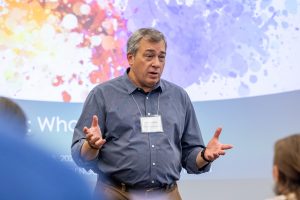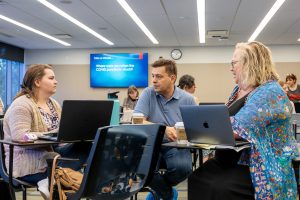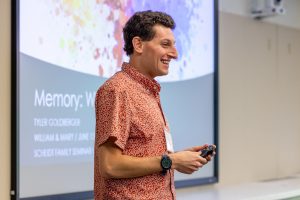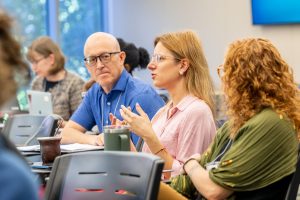First Scheidt Family Seminar Fellows at UConn Join Growing International Genocide Prevention Network
In the large room on the first floor of the Bousfield Psychology Building at UConn Storrs, a group of 19 people sit in a circle.
They’re about as diverse as can be. One is a Ph.D. student from Massachusetts, another is a lecturer from Kenya. One is a sociology professor at a community college in New York, another is a professor of international human rights law from Argentina, and yet another is a professor of diaspora studies in India.
All told, the 19 participants represent eight different countries, an array of life experiences, and vastly differing cultures.
But at this moment, sitting in that circle, most are experiencing a very similar feeling.
Discomfort.
They’re shifting in their seats. Eyes dart about the room. Some are frowning or sighing or smiling nervously. No one leaves, but no one looks terribly happy to be staying.
Just an hour before this exercise started, they’d been warned.
In his introductory remarks to the group, their host for the week – the director of UConn’s Dodd Human Rights Impact Programs, James Waller, the Christopher J. Dodd Chair in Human Rights Practice – had told them straight away: Get ready to be uncomfortable.

“Commit to the hard work of making discomfort productive,” he told them. “That discomfort can have a value to it if we agree to make it productive.”
While the 19 participants knew when they applied to be fellows in the 2024 edition of the week-long Scheidt Family Seminar on Genocide Studies and Prevention at UConn that they’d be covering difficult topics, it’s clear that most of them did not expect to be challenged at 10:45 a.m. on day one, right out of the gate.
In contrast to the uneasiness of the fellows, their instructor for this exercise, Vahidin Omanović – a genocide survivor, peacebuilder, and co-founder of the Center for Peacebuilding in Sanski Most, a town in Bosnia and Herzegovina – is a model of calm. And dry wit.
He’s asked the fellows to draw six boxes on a piece of paper, to think about themselves, and to write a word in each square that describes a part of their individual identity.
One identity in each of the six boxes. Simple, right?
Maybe not.
“It can be anything from how you perceive yourself, to how your community perceives you,” he explains, but after a few moments of silence, the questions start.
Can we write more than six?
No. Only six.
Can we hyphenate? Like, put professor-slash-researcher in one box?
“Are you a cheater?” is Omanović’s retort.
But what if I can’t choose only six?
“No hablo Espanol,” he responds, though no one in the room is actually speaking Spanish at this moment.
When they’ve completed the task, they go around the room and each share what they’ve written. Mother, father, grandparent, student, teacher, activist, woman, human, Jew, Catholic, cat meme aficionado – all these words that wrap up into six neat little boxes who they each believe themselves to be.
Then Omanović gives them their next step. They have to cross out the two least important boxes.
Jaws drop. The uncomfortable shifting begins, as does the negotiating.
Do we have to? Two of them? Really? Least important, how?
“No hablo Espanol,” Omanović responds.

Once they cross off two, Omanović comes at them again. They now have to cross off two more, leaving them with only the two identities that they perceive as their most important written on their papers.
There’s less negotiating this time around. The fellows know there’s no way out of this, so boxes are dutifully crossed.
And then comes the predictable final blow – Omanović tells them to cross off one more box.
They’re left with only one identity left on the page, the one that should mean the most to them.
As they start to go around the room to explain why they chose that last box as their most important, the guilt some of them feel is palpable. Crossing off “mother” or “educator” in favor of something else feels like a denial or a betrayal of some part of themselves – or of other people in their lives.
The point of the exercise, Omanović explains, is to help make each fellow aware of who they are, but also to help them think of themselves in terms of how their identity is disseminated and how each part of a person’s identity can relegate them into a group.
Because in the world of genocide prevention, as Waller explained earlier that morning, identity matters an awful lot.
One social identity – one box on a piece of paper, with one word written inside – could be a society’s dividing difference.
“The heart of genocide,” says Waller, a social psychologist who has spent his career studying and teaching about perpetrator behavior and genocide prevention, “is one social identity hoping to wipe out another social identity. In a deeply divided society, the differences matter to people, not the similarities.
“The crime of genocide is essentially about saying to someone, ‘You think you’re all these things, but to us, you’re just this one thing and this thing only. And this thing doesn’t deserve to live,’” he says.

This year marked the sixth time the seminar has been held, but the first time at UConn – Waller originally launched the program during his time at Keene State College in New Hampshire with support from the Charles E. Scheidt Family Foundation and brought the program with him when he joined the faculty at UConn and Dodd Impact Programs in 2023.
Though the seminar has been continually refined since it first launched in 2016, its goal remains relatively the same – it uniquely focuses on the study, research, and teaching of genocide prevention across all phases of the conflict cycle.
“This is not a focus on history lessons,” Waller says, “but on lessons learned from history.”
It’s that focus on prevention that makes the program unique, Waller notes, because genocide doesn’t just happen out of the blue. It’s a process. There are signs and symptoms that tell when a society is on the verge of genocide.
“And that process is important, because if you start at the end-state – piles of bodies – there’s no prevention at that point,” Waller says. “We have to go back to the beginning of the process. When you understand the process that leads to the end state, you open those windows of opportunity.”
After the introductory first day, each consecutive day of the seminar – led by an international teaching team, including UConn faculty – focuses on a different aspect of genocide prevention: upstream prevention, which involves recognizing the risk factors and taking action before atrocity occurs; midstream prevention, including responses to genocide and atrocity as it’s happening; and downstream prevention, which happens after an atrocity has occurred and includes transitional justice and the importance of memory and how we deal with the past.
Each aspect of the program is just as relevant now as it was when the seminar first launched, the organizers say.
More than 50 percent of the world’s population currently lives in a country led by an autocratic or authoritarian regime, and even functioning democracies around the world are currently struggling with what it means to be a democracy, according to Waller.
“In deeply divided societies, the fault line is always there,” says Waller, “and you’re just waiting for something to trigger that potential for violence.”
“If we don’t address these issues, if we don’t take them seriously, then this pattern of violence, of one group against another, and of divided societies, will simply continue, and that is a danger to every one of us,” says Charlie Scheidt, the former chief executive officer of Roland Foods, supporter of the seminar, and a lifelong advocate for genocide prevention who joined this year’s fellows for the first two days of the program.
“This seminar is an opportunity to reach teachers and practitioners and academics and researchers who can make a difference and who can spread the belief that genocidal violence is caused by people. If it’s caused by people, then it can be stopped by people, and it’s up to each one of us to do our part,” Scheidt says.

The fellows who take part in the program do so in order to take what they’ve learned back to their home institutions, programs, and countries to develop minors, majors, modules, and courses related to genocide prevention.
While the materials that they study and the techniques that the fellows learn play an important role in that effort, one of the longer benefits of the program, Waller says, is the international community of academics and activists committed to genocide prevention that’s been built by the program’s fellows over the last eight years.
“What I’ve been struck with is just the networking that continues after they’ve gone, whether it’s on WhatsApp or it’s through some of the more formal systems we set up,” he says. “We have a very active alumni base of now close to 120 people who’ve been through this program. We’ve really had some incredible success with people leaving the seminar, and they’ve made their own courses, or they’ve reconfigured a large part of a course. We’ve had a couple of universities develop a minor in Holocaust and genocide studies because of their time here.”
This year’s fellows have now joined that important network, and while 2024 marked the first year that the seminar was held at UConn, it won’t be the last.
Scheidt’s foundation has agreed to support four more years of the program in Storrs because, as Scheidt notes, “Rome was not built in a day” and the need is still great.
“Every time the seminar occurs, we make the world a better place, little by little,” Scheidt says. “We believe that we can make the world a better place today and for the future – for future generations. That’s what motivates me.”
For more information about human rights educational and outreach opportunities at UConn through Dodd Human Rights Impact Programs and the Gladstein Family Human Rights Institute, visit humanrights.uconn.edu.
Latest UConn Today
- UConn Hosts Sustainability Summit for Northeast Higher EducationConference highlights UConn's sustainability leadership among universities and colleges in the northeast.
- National Impact for CT AHEC and its Urban Service Track/AHEC Scholars from UConn HealthUST/AHEC Scholars alumni from UConn's dental and medical schools present at the National AHEC Organization Conference.
- UConn Magazine: The Good NeighborMichelle (Bussiere) Puzzo ’98 (SAH) is transforming Connecticut communities with a growing business and a simple mantra, “Just help people that say they need help”
- Five UConn Student Teams Innovate Decarbonization This Summer Through Eversource-Supported ChallengeThe winning team will receive additional funding to continue their work throughout the academic year
- Professor John Mathieu to Receive Academy of Management Organizational Behavior Lifetime Achievement AwardMathieu was nominated for the award by a team of former Ph.D. students, who contacted 30 professional acquaintances and asked them to submit recommendations to the 21,000-member Academy. While Mathieu said he is proud to see the impact of his work, he is equally excited to have mentored so many outstanding students.
- Leading with Resilience Personally and ProfessionallyMeet Resilient Administrative Program Coordinator Cassandra Keola of UConn School of Medicine’s Department of Medicine












